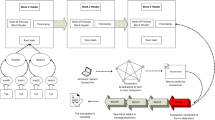Abstract
The research focuses on the analysis and ranking of effects from the implementation of blockchain technology. Currently, most of the work in this area is devoted to the introduction of blockchain technology into information systems, the functions of which are usually limited to a specific area of operation. At the same time, as the analysis reported, the capabilities of application of blockchain technologies go beyond one area of operation. Banking, the public sector and the healthcare sector are the most important sectors for the implementation of blockchain technology. Companies are interested in introducing blockchain technology into their information systems, but they are unable to quickly analyze the effects of this technology. The article proposes to use a new method of multi-criteria evaluation of these effects, which is based on the idea of sharing inaccurate product models of decision-maker preferences, as well as theory of planning experiments aimed at extracting and using expert’s knowledge about blockchain technology.


Similar content being viewed by others
REFERENCES
Alketbi, A., Nasir, Q., and Abu Talib, M., Novel blockchain reference model for government services: Dubai government case study, Int. J. Syst. Assur. Eng. Manage., 2020, vol. 11, pp. 1170–1191.
Banerjee, A., Blockchain technology: Supply chain insights from ERP, Adv. Comput., 2018, vol. 11, pp. 69–98.
Barata, J., et al., Mobile supply chain management in the Industry 4.0 era: An annotated bibliography and guide for future research, J. Enterp. Inf. Manage., 2018, vol. 31, no. 1, pp. 173–192.
Batubara, F., Ubacht, J., and Janssen, M., Challenges of blockchain technology adoption for e-government, Proceedings of the 19th Annual International Conference on Digital Government Research: Governance in the Data Age, Delft, 2018.
Bulycheva, A.A., Approaches to the introduction of blockchain technology in the banking sector, Bull. Sci. Educ., 2018, no. 7, pp. 40–45.
Cerullo, G., Efficient Supply Chain Management: Traceability and transparency, 12th International Conference on Signal-Image Technology and Internet-Based Systems, 2016.
Ehrgott, M., Multicriteria Optimization, Springer-Verlag Berlin Heidelberg, 2005, 2nd ed.
Ganne, E., Can Blockchain revolutionize international trade?, in WTO Publications, World Trade Organization, 2018.
Grabisch, M. and Murofushi, T., Fuzzy Measures and Integrals: Theory and Applications, Physica-Verlag, 2000.
Helo, P. and Hao, Y., Blockchains in operations and supply chains: A model and reference implementation, Comput. Ind. Eng., 2019, vol. 136, pp. 242–251.
Jeppsson, A. and Olsson, O., Blockchains as a Solution for Traceability and Transparency, Lund University, 2017.
Kagermann, H., Change through digitization—value creation in the age of Industry 4.0, in Management of Permanent Change, Wiesbaden: Springer Gabler, 2015, pp. 23–45.
Kazakov, O.D., et al., Digitalization of accounting of professional competences of citizens on the basis of distributed registers and smart contracts technologies, Biz. Inf., 2018, no. 4, pp. 43–53.
Korpela, K., et al., Digital supply chain. Transformation toward blockchain integration, Hawaii International Conference on System Sciences (HICSS), Big Island, Hawaii, 2017, vol. 50.
Koteska, B., et al., Blockchain implementation quality challenges: A literature, SQAMIA 2017: 6th Workshop of Software Quality, Analysis, Monitoring, Improvement, and Applications, Belgrade, 2017, vol. 1938, p. 88.
Maestrini, V., et al., Supply chain performance measurement systems: A systematic review and research agenda, Int. J. Prod. Econ., 2017, vol. 183, pp. 299–315.
Mearian, L., Blockchain integration turns ERP into a collaboration platform, Computerworld. https://www.computerworld.com/article/3199977/enterpriseapplications/blockchainintegration-turns-erp-into-a-collaboration-platform.html. Accessed February 2, 2020.
Notani, R., Can Blockchain Revolutionize the Supply Chain?, London, 2018.
Parikh, T., The ERP of the future: Blockchain of Things, IJSRSET, 2018, vol. 4, no. 1.
Parung, J., The use of blockchain to support sustainable supply chain strategy, IOP Conf. Ser.: Mater. Sci. Eng., 2019, vol. 703.
Pavlov, A.N., et al., The technique of multicriteria decision-making in the study of semi-structured problems, Cybernetics and Mathematics Application in Intelligent Systems: Proceedings of the 6th Computer Science On-line Conference (CSOC2017), 2017, vol. 2, pp. 131–140.
Petrovsky A.B., Teoriya prinyatiya reshenii (Decision Theory), Moscow: Akademia, 2009.
Petrovsky, A.B., Group verbal decision analysis, in Encyclopedia of Decision Making and Decision Support Technologies, Hershey, New York: IGI Global, 2008, vol. 1, pp. 418–425.
Ruzakova, O.A. and Grin, E.C., Application of the blockchain technology to the systematization of the results of intellectual activity, Bull. Perm Univ., Law Sci., 2017, no. 38, pp. 508–520.
Sullivan, C. and Burger, E., E-residency and blockchain, computer law and security review, Int. J. Technol. Law Pract., 2017, vol. 33, no. 4, pp. 470–481.
Song, J., et al., Applications of blockchain to improve supply chain traceability, Procedia Comput. Sci., 2019, vol. 162, pp. 119–122.
Swan, M., Blockchain: Blueprint for a New Economy?, O’Reilly Media Inc., 2015.
Tribis, Y., et al., Supply chain management based on blockchain: A systematic mapping study, MATEC Web of Conferences, IWTSCE’18, 2018.
Tsyganov, S.N., Application of blockchain technology for data storage of electronic medical records of patients, Fundam. Issled., 2017, no 11-2, pp. 338–343.
Westerkamp, M., et al., Blockchain-based supply chain traceability: Token recipes model manufacturing processes, 2018 IEEE International Conference on Blockchain, Halifax, 2018.
Yli-Huumo, J., et al., Where is current research on blockchain technology?—A systematic review, PloS One, 2016, vol. 11, no. 10.
Funding
Studies carried out on this topic were carried out with partial financial support of RFFI grants (nos. 17-29-07073, 19-08-00989), within the framework of budget theme no. 0073-2019-0004.
Author information
Authors and Affiliations
Corresponding authors
Ethics declarations
The authors declare no conflict of interest.
About this article
Cite this article
Sokolov, B., Kolosov, A. Blockchain Technology as a Platform for Integrating Corporate Systems. Aut. Control Comp. Sci. 55, 234–242 (2021). https://doi.org/10.3103/S014641162103010X
Received:
Revised:
Accepted:
Published:
Issue Date:
DOI: https://doi.org/10.3103/S014641162103010X




